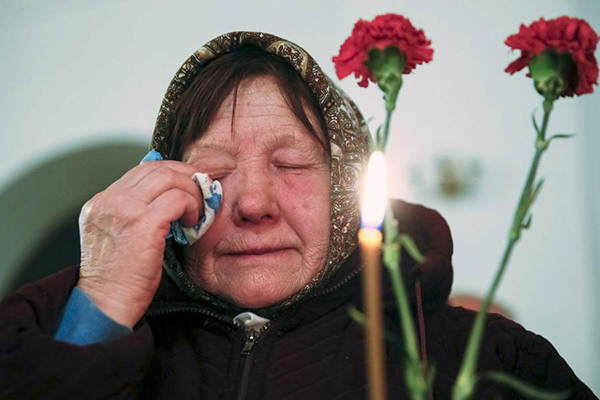Chernobyl anniversary puts spotlight on nuclear safety
Updated: 2016-04-27 07:14
(China Daily)
|
|||||||||
 |
|
A woman cries during a memorial service for victims of the Chernobyl nuclear disaster in a church in Kiev, Ukraine, April 25, 2016. [Photo/Agencies] |
On Tuesday, Ukraine marked the anniversary of the world's worst nuclear disaster. The meltdown at the fourth reactor at the nuclear power plant in Chernobyl happened 30 years ago, but the wounds it inflicted on the world's psyche are still felt today.
Especially as fears of new leaks at Chernobyl increase as the concrete structure covering the reactor ages. It is estimated that only 3 percent of the reactor's radioactive contents escaped at the time.
And people's fears about nuclear power plants after the Chernobyl disaster were only exacerbated by the meltdown at Japan's Fukushima Dai-ichi nuclear power plant in March 2011 following a massive earthquake and tsunami.
The safety of nuclear power plants is a particularly pertinent issue for China. With 30 nuclear power plants already in operation and 24 under construction, it is already one of the countries with the most nuclear plants in the world.
The size and planned scale of growth in China's nuclear energy sector pose unprecedented security challenges to regulators, especially as the country intends to build more nuclear power plants in heavily populated areas.
So far, the country has a good nuclear security record, with no major accidents having occurred thanks to its "most stringent security monitoring system", as President Xi Jinping pointed out at the recent Nuclear Security Summit in New York.
International cooperation programs, such as the Center of Excellence on Nuclear Security set up jointly by China and the United States, also help China meet the world's highest nuclear security standards.
But the progress made in nuclear security should not breed complacency. Although China has formed nuclear emergency teams to deal with mishaps and disasters, more information about how they will operate in case of disasters and how routine security measures are conducted, such as inspectors' onsite checks at nuclear facilities, is needed to help dispel people's fears.
Regulators must also stand on guard against any impulse to launch a "great leap forward" in the construction of nuclear power plants by local authorities in pursuit of higher GDP figures.
Nuclear power is fundamental for the country to honor its climate change pledge to peak its carbon emissions by 2030, and to help meet people's demands for clear air and a healthy environment, but safety must always come first.
Any lapse in supervision will not only derail China's ongoing efforts to transition to cleaner energy use, but also imperil people's health and safety.
Related Stories
Around 160 estimated return to Chernobyl exclusion zone to live 2016-04-26 11:25
30 years on, Chernobyl still calls 2016-04-26 11:06
A look at the 1986 Chernobyl nuclear disaster in numbers 2016-04-26 10:07
No place like home, even in Chernobyl 2016-04-25 09:08
Are human beings worse than Chernobyl? 2016-01-11 07:56
Study shows wildlife has rebounded since Chernobyl disaster 2015-10-08 07:48
Today's Top News
Beijing least affordable city in the world to rent
US accused of 'hyping up' military flights
Banks offer passport to integration
Obama casts doubt on post-EU deal
Chinese runners flood London for marathon
Chinese philanthropists explore British way of 'giving'
Back on the up
China leads way on US adoptions
Hot Topics
Lunar probe , China growth forecasts, Emission rules get tougher, China seen through 'colored lens', International board,
Editor's Picks

|

|

|

|

|

|







